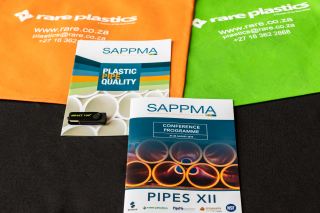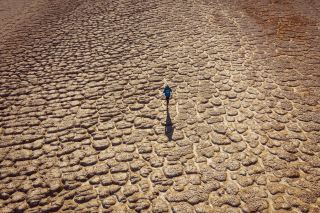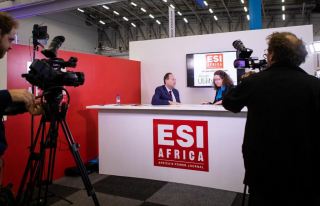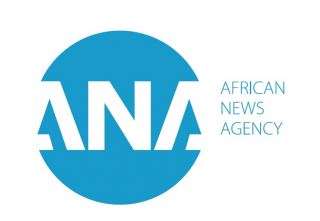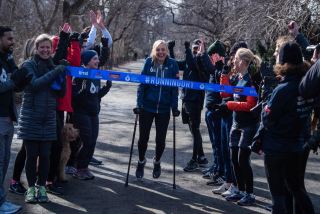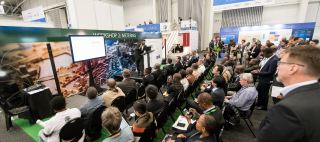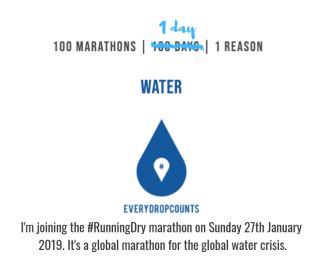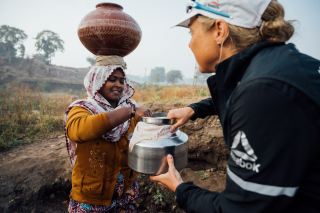Solving the Western Cape’s water crisis and others in Southern Africa through gravity-driven water delivery systems
The Trans Africa Water Alliance (TAWA) consortium has announced a far reaching plan - three years in the making - to solve the looming water crisis in parts of South Africa, starting in the Western Cape. Under the leadership of Dr. Konstant Bruinette, former Chairman of the consulting team behind the acclaimed Lesotho Highlands Water Project (LHWP), the consortium's plan uses the principle of gravity-driven pipelines to bring water to drought stricken areas.
Intrinsic to the plan is that each project will pay for itself over a number of years.
TAWA comprises civil engineers, government partners and other relevant role players. Although the idea of building gravity-driven water delivery systems for Southern Africa is not new, the significant funding challenges posed have meant that these ideas have, until now, not been implemented to deliver the water required.
The 2017 water crisis in the Western Cape has prompted TAWA to promote four major pipeline projects to the Western Cape authorities, the Development Bank of Southern Africa, the Trans Caledon Tunnel Authority, Department of Water Affairs and Sanitation and the Presidential Infrastructure Coordinating Commission as well as authorities in Namibia, Zambia and Botswana.
The proposed major pipelines are the line from a new dam on the Orange River at Vioolsdrif to the Cape Town Metro; the line from Vioolsdrif to Swakopmund; a line from the Kunene River to outside Windhoek; and a fourth line from the Zambezi River to Eastern Botswana and South Africa.
Plans and cost estimates for four smaller pipelines have also been prepared and proposed to various water authorities. These are from the Eastern Cape's Van Der Kloof Dam to deliver water to Port Elizabeth and then to Cape Town; a second line from Boegoeberg to Cape Town; a third from Colenso to Albert Falls and on to Durban, and lastly from western Lesotho to the Modder River to supply water to Bloemfontein.
Bruinette and his team believe these gravity lines will solve the bulk of water problems in Southern Africa. The main constraining factor for water authorities is the funding required for these projects.
TAWA has responded by actively seeking funders for these long term plans.
Less cost than desalination
According to Bruinette, the most urgent project is the construction of a first phase Vioolsdrif Dam on the Orange River, and then to build a gravity-driven water delivery pipeline to the existing Voelvlei Dam, which currently supplies water to the Cape Town Metro water system.
This is so that the Western Cape no longer has to rely only on rainfall and be at the mercy of intermittent, catastrophic droughts.
The cost of the project will vary from US$2.5 billion to $4,5-billion depending on whether the Cape Town water supply quantity is expanded by 15% or to 50%.
The proposed cost is below US$1 per cubic meter which is a fraction of the cost of desalinated water and can be delivered over four years from start of the project to completion.
Later phases include plans to similarly bring water to Swakopmund in Namibia, as well as other drought stricken areas of Botswana and South Africa.
Reliable and sustainable
By way of background, a gravity-driven system allows water to flow through pipelines over vast distances under the force of gravity without the use of external and costly energy sources such as pumping. Gravity-flow water delivery systems are reliable, cost-effective and can deliver large quantities of water to areas a long way from the source.
In 1986, Lesotho and South Africa signed a treaty to harness the former's abundant water resources. Dr. Bruinette’s engineering consultancy, BKS, in a joint venture with Acres International of Canada, was then commissioned to plan, design and project manage the construction of Phase One of the Lesotho Highlands Water Project (LHWP).
Since then the LHWP has been acknowledged as a feat of engineering excellence, its essential achievement being the use of gravity fed tunnels and pipelines from dams to divert water from the mountains of Lesotho to water-starved Gauteng and other areas.
Dr. Bruinette explained, “This concept is not new and goes back thousands of years to Roman times. As long as the source of the water is higher in altitude than the delivery point, the water will continue to flow. The Romans successfully used aqueducts to move water over vast distances under gravity. This literally transformed civilization in Europe. Obviously, modern technology allows us to vastly improve on this ancient system.”
Opportune time
Questions will inevitably arise about international co-operation, funding, environmental impact and many other key issues. These will be answered.
However having worked on the scheme over the past three years, Dr. Bruinette and his partners believe the time is now for government, business, development agencies and other stakeholders to seriously consider an economically-sound and practical solution to the problem of water supply to Cape Town, and other areas in southern Africa, over the next 50 years.
“This solution is not a fantastic pipe-dream. LHWP has shown over more than 30 years that a gravity-driven water supply is a practical and economic way of solving the problem,” Dr Bruinette said. “We are actively engaging with potential investors in South Africa, Europe, USA and the UAE and we need government, local authorities and the general public to get behind this project.” he concluded.
/ends
About TAWA
The Trans Africa Water Alliance (TAWA) was registered in 1972 by Dr Konstant Bruinette an expert in the field of water with over 30 years of experience delivering water successfully to Gauteng via the Lesotho Highlands Water Project (LHWP), for which he was the team leader in the early 80's. Thirty years on Phase Two of the LHWP is underway. The proposed TAWA plan is to supply fresh water from the major rivers in Southern Africa, the Orange River, the Kunene River and the Zambezi River, by gravity with no pumping, to the thirsty countries of Namibia, South Africa and Botswana.
Issued on behalf of: The Trans Africa Water Alliance (TAWA)
Client contact: Dr Konstant Bruinette
Email: This email address is being protected from spambots. You need JavaScript enabled to view it.
Editorial contact: Kerry Botha
Tel. No. 083 263 0644
Email: This email address is being protected from spambots. You need JavaScript enabled to view it.
About Dr Bruinette
Dr. Konstant Bruinette has a PhD in structural engineering from the University of Illinois, USA, where the National Aeronautical and Space Administration (NASA) funded his doctoral thesis on the Analysis of Space Frames. He received MSc(Eng) and BSc(Eng) degrees from the University of Pretoria – both Cum Laude.
He is a member of the South African Institution of Civil Engineering and a Professional Engineer registered with the Engineering Council of South Africa. He was for many years a member of the American Association of Civil Engineers as well as a Board member of the Foundation of Research Development, a sister organization of the CSIR.
He is a leader of people and businesses with strong engineering, technical and innovative skills.
GROWTH, OPPORTUNITY AND POSSIBILITIES FOR PLASTIC PIPE INDUSTRY
The Southern African Plastic Pipe Manufacturers’ Association - with the support of Rare Plastics, Sun Ace, Sizabantu Piping Systems, NSF International and Pipeflo - has concluded hosting its very successful PIPES XII Conference. This year’s event took place on the 27thand 28thof August at the Altron Conference Centre in Midrand and attracted more than 180 delegates, 11 local and 4 international presenters, 15 exhibitors and 9 sponsors who gathered to learn about best-practice designs and applications, share ideas and discuss the latest innovations in so far as plastic pipe manufacturing and installations are concerned. “This year’s event not only provided a platform for our own experts to present, but also drew international participation from as far afield as Germany, Austria and the Middle East. Delegates who attended represented a wide range of different ages, background and industries to include students and academics, engineers, industry representatives, local government, parastatals, pipe fittings and extrusion equipment manufacturers, raw material suppliers and consultants,” reported Jan Venter, Chief Executive Officer of SAPPMA.
Setting the stage: Good news for SA
Economist and scenario analyst Dr Roelof Botha, delivered an optimistic, witty and honest opening keynote address entitled: “Economic recovery beckons if the NDP is implemented” in which he unpacked the challenges and obstacles to growth, but also the exciting opportunities that await South Africa over the next 12 to 18 months. Whilst poor economic leadership over the last 10 years has left South Africa reeling and resulted in GDP losses of at least R2.5 trillion, R653 billion foregone in tax revenue of cost each South African an average of R48 thousand, Dr Botha said that it was not all doom and gloom. He shared good news of real growth reported in retail sales, mineral sales, short term insurance premiums, household and disposable income. “Every problem we have (in South Africa today) can be solved with the right policies and right skills,” Dr Botha said, highlighting the need for more infrastructure and better governance “We are starting to see various green shoots as the positive effect of President Ramaphosa’s leadership. If this continues we can be confident of the future. We have never been in a better position to grow the economy at significantly higher rates than ever before!”
The role of plastic in pipes
The theme of the 2019 PIPES XII Conference was, “Not all plastics are alike” and presenters were encouraged to present their ideas around this theme. “It is almost impossible to imagine our modern life without use of plastics. This versatile material has become deeply embedded in our everyday lifestyle. Although the use of plastic packaging has come under harsh criticism by environmentalists and the public alike over the past year, it is important to recognise that not all plastic is bad for the environment. It is an extremely useful product that is used with great success in pipelines, appliances, cables, computers etc to reduce manufacturing costs, improve performance and reduce mankind’s impact on the environment,” Venter said during his opening speech.
Bigger markets and growing demand
The other the presentations showed how research and development to improve the polymers and processing equipment are dynamic and ongoing throughout the world. This has resulted in the plastic pipe industry enjoying a dominant footprint in most countries. In South Africa, the market grew by 22 % over the past 7 years in order deliver the infrastructure needed support a growing population. Similarly, the development of new markets and applications were unpacked by the various presenters who focussed on outstanding properties of modern plastic pipes, such as flexibility, toughness, corrosion resistance, the growing demand for large diameter pipelines (with pressure pipe now up to 3m diameter), as well as various other exciting technological advancements and applications.
Feedback from presenters and delegates
Feedback received from the delegates were very positive. “This was my first attendance at a PIPES Conference and I thoroughly enjoyed the wide scope of presentations that were delivered. It was interesting to hear about the experiences from the end-users (engineers and consultants),” said Giel van Jaarsveld of SASOL, while Kudzai Jinjika of Proplastics said “the conference was exciting and informative. The excitement was maintained since the very beginning and the food and services were exquisite. I really wished it could be longer than two days!” “One of the best conferences I have attended, thank you!” said Japie Botha of Pro-Plan Consulting Engineers. International presenter Stefan Schiesser of Borealis said “This was a very open and fair conference with excellent possibilities for discussions in the breaks and at the end of the days,” while local presenter Onno Fortuin said “the interaction between industry, suppliers, engineers and planners are critical for the way forward”.
Looking ahead
“Modern plastic pipe materials can be relied upon to provide cost effective pumping solutions, exceptional health standards and previously unheard of service lives. For this reason, it is of great importance to host an annual industry-specific event where we can sharing the latest technical information about design, manufacture, maintenance, evaluation, testing procedures and standards. In an era where taking shortcuts and cutting corners have become the norm, SAPPMA plays an instrumental role in the development, advancement and maintenance of correct standards and performance of piping systems. Together with our members, we will continue to be the flagbearers for maintaining excellent standards and quality in a very important industry through the commissioning of reliable and knowledgeable consultants, pipe manufacturers and installers,” Venter concluded. For more information visit www.sappma.co.za
-- ENDS --
Note to the Editor:
SAPPMA as launched in 2004 to represent the interests of the well-developed plastic pipe business in South Africa and surrounding countries. The purpose of this voluntary, self-regulating association (registered as a Section 21 Company in terms of the Companies Act of SA) is to create consumer confidence within the plastic pipe industry by promoting the production and use of high quality plastic pipes and pipes systems. Only plastic pipes that are manufactured by SAPPMA members and are able to demonstrate that they meet local and international quality standards, are allowed to display the SAPPMA logo.
VOTE FOR THE #RUNNINGDRY CAMPAIGN
Make your mark for real Sustainable Development Goals
Australia, 26 April 2019: Finally, a chance to cast a vote to make a real difference for our world! The #RunningDry Campaign, started by international water advocate and ultra-marathon runner, Mina Guli, has been announced as a finalist in the United Nations Sustainable Development Goals Action Campaign Awards (UN SDG Action Awards). Nominated for the People’s Choice Award, #RunningDry needs your vote to help make saving water -- our world’s most precious resource – an even bigger priority.
Voting for the SDG Action Awards People Choice Award is open now and the winner is determined by the finalist who receives the most votes on Facebook, LinkedIn, Twitter and Instagram. To vote for #RunningDry, like and share the #RunningDry post here: https://sdgactionawards.org/initiative/1443
Voting closes soon so please vote today.
The UN SDG Action Awards recognize individuals, civil society organizations, subnational governments, foundations, networks, and private sector leaders who are advancing the global movement for the Sustainable Development Goals in the most transformative, impactful and innovative way.
From more than 2000 applications from 142 countries, three finalists have been selected for each of the 7 categories: mobilizer, storyteller, campaigner, connector, visualizer, includer and creative. In addition to the People’s Choice Award, #RunningDry is a finalist in the “campaigner” category for its powerful 100-day campaign to demonstrate a 100 per cent commitment to solving the global water crisis.
With the exception of the People’s Choice Award which is determined by public vote, a judging panel of more than 20 experts will determine the seven category winners. All winners will be announced at the SDG Global Festival of Action Awards ceremony in Bonn, Germany on Thursday 02 May at 6pm CET.
“I am immensely honoured that our fabulous #RunningDry community has been selected as a finalist for the UN SDG Action Awards!” beams Mina. “It’s a massive deal and great kudos for our entire community who stepped up to run, donating their distance to help change how we all think about water.”
To vote for #RunningDry please visit https://sdgactionawards.org/initiative/1443. There is no limit on the number of social media platforms you can cast your vote on – so please get voting NOW!
To find out more about what you can do to stop our world from #RunningDry visit:
Website www.minaguli.com
Facebook @MinaGuliWater
Twitter @MinaGuli
Instagram @minaguli
ESI Africa on load-shedding: knowledge is power!
ESI Africa premium media partner at African Utility Week & POWERGEN Africa
"Whether you want to call it load-shedding, a blackout, load-shifting or load sharing, remember that this affects everyone. We are in this together so join your neighbourhood Whatsapp or Facebook group to stay informed.” So says Nicolette Pombo-van Zyl, editor ESI Africa, a leading energy industry journal.
Off the grid
“It is not really viable at this stage for the average suburban household to go completely off the grid to avoid the effects of load-shedding” says Mrs Pombo-van Zyl, adding “but, it is possible to develop a back-up plan for when the grid goes down. The ideal option is solar PV but this requires an investment, which will eventually pay off in the long run. One could just invest in a solar water heater system or take the route of rooftop solar with a battery storage unit.”
“Back-up generators are also an option, especially for businesses although they can be noisy and cumbersome to set up and prove dangerous for people not familiar with this type of equipment. Another off-grid option is to change to gas for cooking and lighting.” She continues: “some people may think that they are experiencing load-shedding when in actual fact their main has tripped. Invest in battery-operated torches and lighting and regularly check the batteries. Ensure that your mobile phones are charged. Also be more vigilant when driving as a lot of traffic lights are affected.”
ESI Africa at African Utility Week
The potential of renewable energy sources such as solar, storage solutions and mini-grid generation projects are some of the exciting focus areas at African Utility Week and POWERGEN Africa taking place from 14-16 May in Cape Town. The South African Minister of Energy, Honourable Jeff Radebe, is heading up a stellar line up of expert speakers and will once again deliver the opening ministerial address on 14 May. The 19th edition of this flagship conference and exhibition is expected to attract more than 10 000 energy and water professionals this year.
ESI Africa is the longstanding host publication of the event and also has an onsite studio on the expo floor to interview dozens of experts for its online portal. Says ESI Africa’s editor Nicolette Pombo-van Zyl: “this annual event is marked in my diary as a ‘must-attend’ to meet with industry stalwarts and the up-and-coming young leaders. I’m keenly looking forward to three intense days of on-point conversations around what’s happening in the industry, what to expect in the coming year, and the solutions driving development. Also, as a moderator for one of the conference sessions, I’m excited by the prospect of debating risks and opportunities in a way that could very well deliver a primed solution to the attending delegates who have travelled from far and wide.”
She continues: “it’s going to be another superb year for the ESI Africa team as our bumper issue of the journal is being distributed in the delegate bags and VIP areas. As the official host publication, ESI Africa is the only media house with an onsite studio where on-camera interviews will be conducted over the three days of African Utility Week & POWERGEN Africa. Another activity is our sought-after roving camera team who will be visiting expo booths that have pre-booked an interview with us.”
The ESI Africa television studio is strategically positioned on the exhibition floor for easy access, says Nicolette: “this is where our team of editors will conduct professional on-camera interviews with conference speakers, VIP guests, and profiled attendees to reap their industry knowledge for our readers’ benefit.
“You can also rely on the editorial team to keep you posted on what’s happening as they will be reporting live from the conference sessions using the ESI Africa social media channels and website. We’re interested in connecting with as many people as possible, so look out for the team at the networking sessions, awards gala, and knowledge hubs.”
African Utility Week and POWERGEN Africa is the flagship energy event organised by Spintelligent, a multi-award-winning Cape Town-based exhibition and conference producer across the continent in the energy, infrastructure, mining and agriculture sectors. Other well-known events by Spintelligent include Future Energy East Africa, Future Energy Nigeria, the Utility CEO Forums, Agritech Expo Zambia, Nigeria Mining Week and DRC Mining Week. Spintelligent is part of the UK-based Clarion Events Group and African Utility Week and POWERGEN Africa forms part of Clarion Energy, which runs over 40 events that cover the oil, gas, power and energy sectors, making it one of Clarion Events’ largest portfolios.
Dates for African Utility Week and POWERGEN Africa:
Conference and expo: 14-16 May 2019
Site visits: 17 May 2019
Location: CTICC, Cape Town, South Africa
Website: http://www.african-utility-week.com
Twitter: https://twitter.com/AfricaUtilities #AUW2019
Linkedin: African Utility Week
Contact:
Senior communications manager: Annemarie Roodbol
Telephone: +27 21 700 3558
Mobile: +27 82 562 7844
Email: This email address is being protected from spambots. You need JavaScript enabled to view it.
African Utility Week and POWERGEN Africa announces media partnership with African News Agency
“Our mission is to deliver authentic African content”
The organisers of African Utility Week and POWERGEN Africa, have announced that they have entered into a media partnership with African News Agency (ANA), a continent-wide multimedia content dissemination platform in the run-up to the event that is taking place from 14-16 May in Cape Town. ANA will also have a presence on the expo floor.
The South African Minister of Energy, Honourable Jeff Radebe, is heading up a stellar line up of expert speakers and will once again deliver the opening ministerial address on 14 May. The 19th edition of this leading conference and exhibition is expected to attract more than 10 000 energy and water professionals this year.
“We’re excited to partner with African News Agency” says African Utility Week and POWERGEN Africa event director Evan Schiff, “over the last couple of years ANA has been able to fill a real need in the market for the effective distribution of news, particularly across Africa.”
“For ANA, African Utility Week and POWERGEN Africa is the perfect strategic forum to meet leading global and African professionals in the energy and water sectors” says ANA CEO Grant Fredericks. He adds: “our mission is to deliver authentic African content, in the form of locally produced stories, images, videos and valuable data, to the world and this event has proven to have been a consistent source of great news content and expert interviews over the years. Our strategic media partnerships across the African continent guarantee that we share and produce ground-breaking content on the hour, by the hour. We look forward to provide many of the African Utility Week and POWERGEN Africa sponsors, exhibitors and speakers with our services onsite.”
International pavilions
Apart from the official U.S. country pavilion at African Utility Week and POWERGEN Africa showcasing specialised technology and services for the utility, metering, renewable and water industries, country pavilions from Brazil, Canada, China, Denmark, France, Germany, India and Poland have also already confirmed their presence at the 3-day event in May.
Industry support
A multi-award-winning conference and exhibition, African Utility Week and POWERGEN Africa has already secured early support from industry stalwarts including Conlog, Dromex, Landis+Gyr, Sumitomo and Utility Systems as platinum sponsors and Aberdare, ADC Energy, Sulzer and Toshiba as gold sponsors.
African Utility Week and POWERGEN Africa is the flagship energy event organised by Spintelligent, a multi-award-winning Cape Town-based exhibition and conference producer across the continent in the energy, infrastructure, mining and agriculture sectors. Other well-known events by Spintelligent include Future Energy East Africa, Future Energy Nigeria, the Utility CEO Forums, Agritech Expo Zambia, Nigeria Mining Week and DRC Mining Week.
Spintelligent is part of the UK-based Clarion Events Group and African Utility Week and POWERGEN Africa form part of Clarion Energy, which runs over 40 events that cover the oil, gas, power and energy sectors, making it one of Clarion Events’ largest portfolios.
Dates for African Utility Week and POWERGEN Africa:
Conference and expo: 14-16 May 2019
Site visits: 17 May 2019
Location: CTICC, Cape Town, South Africa
Website: http://www.african-utility-week.com
Twitter: https://twitter.com/AfricaUtilities #AUW2019
Linkedin: African Utility Week
Contact:
Senior communications manager: Annemarie Roodbol
Telephone: +27 21 700 3558
Mobile: +27 82 562 7844
Email: This email address is being protected from spambots. You need JavaScript enabled to view it.
#RunningDry: People in 50 countries go the distance for water saving
#RunningDry community joins with Mina Guli on marathon 100
International water activist, Mina Guli’s #RunningDry movement came full circle on Monday 11 February, 100 days after Mina kicked off by running the New York Marathon. Having initially started as a solo campaign for Mina to run 100 marathons in 100 consecutive days around the world to raise awareness for the global water crisis, the campaign turned into a movement after marathon 62 when Mina fractured her femur and was no longer able to continue on her own. Thousands of people from more than 44 countries across all 7 continents banded together to cover the distance for Mina, logging a collective distance equal to the distance from the North to South Pole, whilst at the same time pledging to do what they can to save water.
The sport of running was used as a way to highlight water issues around the world. “Over the past 100 days we have seen first-hand the enormous impact on families, communities and economies when taps run dry. But we have also had the privilege of meeting incredible water heroes around the world who are 100 percent committed to helping save our most precious resource,” says Mina Guli.
Starting with the New York City Marathon on the 4th of November 2018, Mina ran a marathon every day, while travelling to run across Europe (UK, France, Italy), Uzbekistan, India, China, Hong Kong, Dubai, the Middle East (Jordan, Palestine, Israel), and South Africa where an acute fracture was identified in her femur. She then went on to Australia before heading back to the USA to finish the 100-day journey back where she started in New York.
“When I broke my leg in Cape Town someone told me an old African proverb – if you want to go fast, go alone; if you want to go far, go together – which perfectly sums up the #RunningDry movement,” says Mina. “Together we have created a movement for change - people around the world stepping up for water saving, and committing to making sure every drop counts.
“From India and China to Uzbekistan and the USA, it’s clear that we still have a lot of work to do. As a member of our community said ‘individually we can make an impact, but together we can change the world!’” says Mina. “Together we’re going to continue this campaign until our planet is no longer #RunningDry.”
Watch this space for an exciting initiative for World Water Day on the 22nd of March from the #RunningDry team. Please continue logging your kilometres for #RunningDry and pledging to do what you can to help save water.
To find out more about the #RunningDry campaign and to log your kilometres, visit Mina’s social media pages.
Website www.minaguli.com
Facebook Mina Guli
Twitter @MinaGuli
Instagram @minaguli
###
ABOUT #RunningDry
Mina and #RunningDry are proudly supported by Colgate and Reebok, as well as the UNESCO World Water Assessment Programme. Other supporting organizations include the Global Water Partnership and the UN Development Programme.
ABOUT MINA GULI
The founder and CEO of Thirst, Mina Guli is a global leader, entrepreneur and adventurer passionate and committed to making a difference in the world. Following a 15-year career as a world leader in climate change that started with law, but progressed quickly to the World Bank and to co-founding boutique investment firm Peony Capital, Mina established Thirst – a non-profit that is solving the water crisis by changing the way we think about water.
To highlight the global water crisis, in 2016 Mina completed the 7 Deserts Run -- running the equivalent of 40 marathons across 7 deserts on 7 continents in 7 weeks. A self-confessed "non-runner", Mina told the stories of some of those affected by the crisis during the run. The success of the expedition encouraged Mina to undertake the 6 River Run in support of the UN’s Sustainable Development Goal 6. She ran 40 marathons in 40 days down 6 of the world’s great rivers on 6 continents. With media coverage around the world, including on CNN, BBC, ITV, ABC and CCTV, Mina’s messages about water have reached more than 4 billion people, inspiring a generation of water heroes.
Mina has been recognised for her leadership: she has been named a Young Global Leader by the World Economic Forum, one of Australia’s most influential women, and by Fortune Magazine in 2016 alongside Angela Merkel, Jeff Bezos, Tim Cook and the Pope as one of the 50 greatest leaders in the world.
ABOUT THIRST
The #RunningDry campaign is organized by Thirst, an international not-for-profit organization focused on educating and promoting action on and solutions to the water crisis. Since its launch in 2012, Thirst has educated more than 2 million students in China, has had more than 600,000 participants in its innovation competitions and now works with more than 1000 qualified volunteers and has the support of the Chinese Government.
Thirst founder and CEO Mina Guli will undertake the #RunningDry campaign.
African Utility Week returns to Cape Town in May with latest updates and success stories in power, energy and water
Mother City to welcome back 10 000+ energy and water professionals
“The African Utility Week conference has a longstanding reputation of producing innovative, topical and high-level content, discussion and engagement” says event director Evan Schiff, adding: “the 19th edition of the event from 14-16 May in Cape Town this year will, once again, not disappoint.”
The new co-location of POWERGEN Africa in 2019 will add an expanded focus on generation, including renewables, off grid, fossil fuels and nuclear, while still concentrating on transmission, distribution, metering, new technologies including storage, mini grids, micro grids, IOT and ICT systems, as well as water.
Along with multiple side events and numerous networking functions the event boasts a five track strategic conference with over 300 expert speakers. An extensive Knowledge Hub programme that is CPD accredited and free to attend, offers hands-on presentations taking place in defined spaces on the exhibition floor. These discuss practical, day-to-day technical topics, best practices and product solutions that businesses, large power users and utilities can implement in their daily operations
.Keynote speakers confirmed so far are:
- Dr Mark Swilling, Programme Coordinator of the Sustainable Development Programme in the School of Public Leadership; the Academic Director of the Sustainability Institute; and the Co-Director of the Stellenbosch Centre for Complex Systems in Transition.
- Prof Anton Eberhard, who the directs Managing Infrastructure Investment Reform Regulation In Africa (MIRA) at the Graduate School of Business at the University of Cape Town. He is also chairing a team appointed by South African President Cyril Ramaphosa to advise on turning Eskom around and restructuring the power sector.
African Utility Week connects experts from the entire power, energy and water value chain, including:
· BEHAVIOUR TRANSFORMATION: “We are inspired to ensure quality utilities are provided to Africa to give the individual the opportunity to independently manage their use of power and water, ensuring a sustainable future.”
- Jodie Sherwin Hill, Executive Director, Jomat Investments Pty (Ltd), and African Utility Week Advisory Board member.
· WATER: “We need for water sectorial practitioners to join hands and force Governments to put the sector in the position where it rightly belongs and that is at the front of all sectors. This would allow the sector to enjoy priority in terms of investments, which was required yesteryear across Africa.”
- Gift Sageme, CEO at Malawi’s Central Region Water Board in Malawi and AUW Advisory Board member.
· HYDROPOWER: “We are contracted by New Africa Power (Mauritius) to develop a 5 project 70MW portfolio of hydro power plants in Zambia. These projects are prepared for qualification under the KfW (German) GETFiT programme. This is a significant step for us and it is exciting to have been able to move beyond South Africa, take a step up in scale and to drive the innovation around our third generation of hydro IPPs.”
- Anton-Louis Olivier, MD, REH, African Utility Week and POWERGEN Africa Advisory Board member and previous winner of an AUW Industry Award for the top Small-Scale Sustainable Energy Project (under 5MW).
· MINI GRIDS: “We have a very exciting project called ViDA (Village Data Analytics) around using satellites to streamline and optimise much of the mini-grid development cycle.”
- Dr Sam Duby, Africa Director, TFE Consulting and panellist at the upcoming African Utility Week and POWERGEN Africa in the Energy Revolution Africa session on “Driving demand and facilitate access to financing in rural areas”.
· SMART ENERGY AND WATER: “We are presently implementing a pilot smart electric water heating project on our CSIR campus in Pretoria, assessing the potential energy savings and benefits in creating a flexible load utilising the considerable energy storage inherent with hot cylinder water heating.”
- Dr Clinton Carter-Brown, Head: Energy Centre, CSIR and AUW Advisory Board member.
· WATER: “Cape Town is a good example that Africa has started to face the effects of climate change by investigating alternative water resources and minimizing the loss of non-revenue water and general water use.”
- Jan Kürstein, Hydrogeologist and Senior Consultant Water and Natural Resources at Rambøll in Denmark and speaker at the upcoming African Utility Week and POWERGEN Africa in Cape Town in May.
· TECHNOLOGY: “At Dromex we see African Utility Week as a point of unity for the African energy sector and an invaluable connection point for innovation and technology within the industry”
- Stel Stylianou, CEO of Dromex, platinum sponsors.
International pavilions
Apart from the official U.S. country pavilion at African Utility Week and POWERGEN Africa showcasing specialised technology and services for the utility, metering, renewable and water industries, country pavilions from Canada, China, Denmark, France, Germany, India and Poland have also already confirmed their presence at the 3-day event in May.
Industry support
A multi-award-winning conference and exhibition, African Utility Week and POWERGEN Africa has already secured early support from industry stalwarts including Conlog, Dromex, Landis+Gyr, Sumitomo and Utility Systems as platinum sponsors and Aberdare and Sulzer as gold sponsors.
The sixth edition of the annual African Power, Energy & Water Industry Awards also returns to celebrate pioneering utilities, projects and people in the energy and water industry on the continent during 2018/2019.
CEO Forum
The Utility CEO Forum is an exclusive, by invitation only, gathering of regional utility CEOs within the power and energy sector providing a unique, safe space for discussion and debate the modern day challenges of their roles in running African utilities in a fast developing market with high political expectations and low returns within aging or no infrastructure. Confirmed industry expert and technology partners for this strategic gathering are Conlog, Eaton, Nyamezela, Ontec, Oracle and Steinmüller.
African Utility Week and the co-located POWERGEN Africa is the flagship energy event organised by Spintelligent, a multi-award-winning Cape Town-based exhibition and conference producer across the continent in the energy, infrastructure, mining, real estate and agriculture sectors. Other well-known events by Spintelligent include Future Energy East Africa, Future Energy Nigeria, the Utility CEO Forums, Agritech Expo Zambia, Nigeria Mining Week and DRC Mining Week. Spintelligent is part of the UK-based Clarion Events Group and African Utility Week and POWERGEN Africa form part of Clarion Energy, which runs over 40 events that cover the oil, gas, power and energy sectors, making it one of Clarion Events’ largest portfolios.
Dates for African Utility Week and POWERGEN Africa:
Conference and expo: 14-16 May 2019
Site visits: 17 May 2019
Location: CTICC, Cape Town, South Africa
Website: http://www.african-utility-week.com
Twitter: https://twitter.com/AfricaUtilities #AUW2019
Linkedin: African Utility Week
Contact:
Senior communications manager: Annemarie Roodbol
Telephone: +27 21 700 3558
Mobile: +27 82 562 7844
Email: This email address is being protected from spambots. You need JavaScript enabled to view it.
100 Marathons in 1 day: #RunningDry now a global movement to raise awareness for the world’s water crisis!
Severe injury turns #RunningDry from a campaign into a movement as community rallies to run marathons and raise awareness about global water crisis with 100 marathons in 1 day
CAPE TOWN, January 22, 2019. Mina Guli’s vision for her 100 marathons in 100 days #RunningDry campaign was simple: to make saving water famous. Just over 2 weeks after announcing her injury on social media and completing 62 marathons in 62 days, this vision has become a reality with #RunningDry becoming a worldwide movement.
“The support I have received from around the world has been so humbling - and so inspiring,” says Mina. “I found out yesterday that my original injuries to my femur have become substantially worse!”
The global running and water communities have rallied around Mina and undertaken to complete the remaining marathons for her. They have already logged more than 8500 km of donated kilometres, which has seen #RunningDry trending on Twitter. “#RunningDry is about using the sport of running to get people around the world to pay attention to the water crisis happening around us,” explains Mina.
“I will honestly be forever grateful to every single person, young or old, walker or runner, for taking time out of their lives to help raise awareness for the global water crisis that we are facing,” says Mina. “I have always said that I want to make saving water so famous that it’s no longer the right thing to do, but the only thing to do. That dream is now becoming a reality!”
On Sunday 27 January, the #RunningDry community will attempt 100 marathons in 1 day - worldwide. 100 marathons in 1 day for 1 reason: water. To take part, supporters will simply run or walk a marathon (or part of a marathon) and log their distance on social media with the hashtag #RunningDry. The marathons will be taking place all over the world, linked together by #RunningDry. Supporters are encouraged to share water facts (available on Mina’s website) and invite their friends to join. To date, the biggest running day has logged 1800km for #RunningDry (42 marathons), so 4200km in one day is an ambitious goal - but one that Mina feels certain the community will rise to.
“There’s an African proverb that says, ‘If you want to go fast, go alone. If you want to go far, go together.’ Well, I’ve gone about as far as I can alone. The next 25 days of #RunningDry are all about collective action.”
Even more committed to the cause since sustaining her injury, Mina will be traveling to the USA from Australia, where she will be spreading her #RunningDry message, as well as meeting with communities already affected by the water crisis and water heroes searching for solutions to this crisis.
To find out more about the #RunningDry campaign and to log your kilometres, visit Mina’s social media pages.
Website www.minaguli.com
Facebook Mina Guli
Twitter @MinaGuli
Instagram @minaguli
MINA GULI MORE THAN 1/3 OF THE WAY THROUGH HER GLOBAL RUN
100 MARATHONS IN 100 DAYS:
MINA GULI MORE THAN 1/3 OF THE WAY THROUGH HER GLOBAL RUN
We are using water faster than it is able to be replenished;
#RunningDry Campaign Raises Awareness, Urges Change
December 6, 2018. On the 4th of November at the New York Marathon, international water advocate, Mina Guli, set out on the ambitious individual challenge of running 100 marathons in 100 days to highlight the global water crisis. Having already completed more than 30 of the 100 marathons, through the UK, France, Italy, Uzbekistan and India, Mina has experienced first-hand ‘choke points’ that are feeling the impact of the emerging global water crisis. Following her final run in India today in Mumbai, Mina now heads to Hong Kong and China.
“My journey so far has allowed me to meet so many incredible people and to see the real effects that water shortages are already having on our world,” says Mina. “For many of us, we don’t have a real concept of where our water comes from. We simply turn on a tap and the water is there. To meet children as young as 3 years old walking more than 2km a day to collect water has given me a real appreciation of just how precious water really is.”
Mina’s passion to change how people think about water and have a world where there is enough water for everyone forever is what keeps her going. She has been meeting with local water heroes within each of the regions she is visiting. These water heroes are people who are devoting their time and energy to making a difference to the global water crisis.
“In the UK, for example, I was joined on one of my runs by Dr Liz Goodwin of the World Resource Institute. Liz ran12.3km with me to represent SDG 12.3 which is the sustainable consumption and production patterns,” says Mina. “I learnt from Liz that if we stopped all food wastage we would be able to save 18% of the world’s water, which is a staggering number if you consider that less than 1% of the earth's water is useable by plants, animals and humans as the rest is "locked" in the oceans, ice caps, glaciers etc. We need to stop living as though everything can be replaced and start placing value on our precious resources.”
So how is she feeling after 30 marathons in 30 days? “Exhausted!” she laughs, “But inspired.” Mina, a 48-year old Australian who is based in Hong Kong, is no stranger to long runs. The #RunningDry Expedition follows the 2016 7 Deserts campaign and the 6 River Run in 2017, which saw Mina complete the equivalent of 40 marathons in 40 days down six of the world’s great rivers. Mina aims to create a global community of water savers and change the way we use and think about water. People can follow her journey on social media where she’ll be documenting the entire expedition.
“As a society, we hold the power,” says Mina. “With that power we need to encourage companies and governments to make a real change in the way we not only use, but also view our precious and incredibly scarce water supply.”
Human civilization is facing an unprecedented crisis: a projected 40% shortfall in the availability of fresh water by 2030 under current business-as-usual projections of population and economic growth.
To follow Mina’s journey and find out how you can make a real difference in solving our water crisis visit:
- Website www.minaguli.com
- Facebook @MinaGuliWater
- Twitter @MinaGuli
- Instagram @minaguli
###
ABOUT #RunningDry
Mina and #RunningDry are proudly supported by Colgate and Reebok, as well as the UNESCO World Water Assessment Programme. Other supporting organizations include the Global Water Partnership and the UN Development Programme.
ABOUT MINA GULI
The founder and CEO of Thirst, Mina Guli is a global leader, entrepreneur and adventurer passionate and committed to making a difference in the world. Following a 15-year career as a world leader in climate change that started with law, but progressed quickly to the World Bank and to co-founding boutique investment firm Peony Capital, Mina established Thirst – a non-profit that is solving the water crisis by changing the way we think about water.
To highlight the global water crisis, in 2016 Mina completed the 7 Deserts Run -- running the equivalent of 40 marathons across 7 deserts on 7 continents in 7 weeks. A self-confessed "non-runner", Mina told the stories of some of those affected by the crisis during the run. The success of the expedition encouraged Mina to undertake the 6 River Run in support of the UN’s Sustainable Development Goal 6. She ran 40 marathons in 40 days down 6 of the world’s great rivers on 6 continents. With media coverage around the world, including on CNN, BBC, ITV, ABC and CCTV, Mina’s messages about water have reached more than 4 billion people, inspiring a generation of water heroes.
Mina has been recognised for her leadership: she has been named a Young Global Leader by the World Economic Forum, one of Australia’s most influential women, and by Fortune Magazine in 2016 alongside Angela Merkel, Jeff Bezos, Tim Cook and the Pope as one of the 50 greatest leaders in the world.
ABOUT THIRST
The #RunningDry campaign is organized by Thirst, an international not-for-profit organization focused on educating and promoting action on and solutions to the water crisis. Since its launch in 2012, Thirst has educated more than 2 million students in China, has had more than 600,000 participants in its innovation competitions and now works with more than 1000 qualified volunteers and has the support of the Chinese Government.
Thirst founder and CEO Mina Guli will undertake the #RunningDry campaign.
Water Temperature and Your Body
Living in a healthy manner is a subjective subject. Health can be defined as various expressions by different individuals. As such, we explore something less subjective – the impact of water temperature on the body.
Cold Water
More often consumed on when one is hot or thirsty – cold water is a great way to thermoregulate the body when there is excess heat generated. The most common time this occurs is when during warmer days or when there is exercise involved. The cold water also serves to replenish fluids lost to perspiration.
On the note of cold water, it is more effective to consume chilled water rather than ice cold water as your body would need to normalise the temperature for use. Chilled water still goes through normalisation processes but at the same time serves to cool the body down. In the case of ice cold water, it serves to shock the system and cause cramping. This normalisation process actually burns calories and as such can help boost your metabolism. The taste of cold water is also more palatable to those beginning their path to the recommended daily intake of water – being roughly 8 cups.
Room Temperature Water
Room Temperature (or ambient) Water is beneficial for digestion. Warm water assists in flushing our hardened minerals and fats that do not serve the body positively. In this flushing process it also serves to ensure regular bowel movements. As room temperature water is easier for the body to process through its lack of need for thermoregulation for the body – it can help with relaxation of body parts and function processes in the body. An example of this is that of relaxation of blood vessels affording better blood circulation.
Room temperature water is also the temperature of choice for singers and voice actors as it serves to relax and warm the vocal chords.
Hot and Warm Water
Conversely to cold water, ambient water can help negate and even subdue cramping by regulating body temperature. Studies show that the introduction of heat to the body – internal or external (as with a hot water bottle) – pain receptors get deactivated in favour of the heat receptors.
Warm water also offers the benefit of assisting during a detox. As the aim of a detox is to remove toxins in the body, the warm water helps to promote perspiration – stimulating the removal of toxins from the body. Toxins get removed through sweat and which is in turn replaced with warm water.
If you want to ensure you and your local environment stay hydrated – be it with cold, ambient or warm water - contact us on 021 813 6631 or alternatively email us at This email address is being protected from spambots. You need JavaScript enabled to view it..

